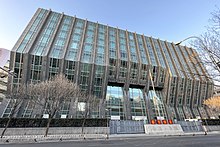|
All-China Federation of Industry and Commerce
The All-China Federation of Industry and Commerce (ACFIC), also called the All-China Chamber of Industry and Commerce (ACCIC) is a people's organization and chamber of commerce, established in 1953 as a successor to the chambers of commerce that were first founded during the Qing dynasty. Today, it consists of Chinese industrialists and business people under the leadership of the United Front Work Department of the Chinese Communist Party (CCP), as well as being a constituent organization of the National Committee of the Chinese People's Political Consultative Conference (CPPCC) and the holder of a number of seats in the National People's Congress. The organization assists the government in managing China's private sector economy and acts as a bridge between the private sector entities and the government.[1][2][3] History
The ACFIC is a non-governmental chamber of commerce established in 1953.[4]: 167 The ACFIC was established to advance the Communist Party's interests and promote the party's policies among private entrepreneurs.[4]: 167 From November 2002 to 2012, the ACFIC had been led by Chairman Huang Mengfu (Chinese: 黄孟复), who, like his predecessors, was also a vice chairman of the Chinese People's Political Consultative Conference National Committee, ranking as a national leader of China. His predecessor was Jing Shuping, founder of the first private bank in modern China and the son of a well-known entrepreneur of the late Qing Dynasty.[citation needed] The first vice-chairman of the ACFIC is Quan Zhezhu (Chinese: 全哲洙), a deputy minister of the United Front Department originally from Jilin. The ACFIC has another 23 vice-chairpersons, most of them private entrepreneurs.[5] OrganizationThe ACFIC is led by a ministerial-level CCP secretary and chairman. The chairman has usually been a member of the China National Democratic Construction Association, also serving as a vice chairman of the Chinese People's Political Consultative Conference.[6] ACFIC leadership is chosen through consultation between the CCP and private enterprise.[7] The ACFIC is a constituent of the CPPCC and is allocated seats to the NPC.[8] ACFIC seeks to influence policy through submitting proposals to the CPPCC, a process which requires relevant government ministries to investigate the proposals and prepare a formal response.[4]: 167 More than 3,000 regional federations of industry and commerce (FIC) have been established in all provinces and prefectures and most counties of China. The relationship between ACFIC and the regional FIC is described as a role of guidance, but the statute of ACFIC is also valid for the regional federations.[9] In September 2020, the CCP announced that it would establish more party committees in regional FICs, and would arrange a special liaison between them and the CCP.[10] See alsoReferences
External links
|
||||||||||||||||||||||||||||||||||||||||||||||||||||||||||||||||||||||||||||||||||||

